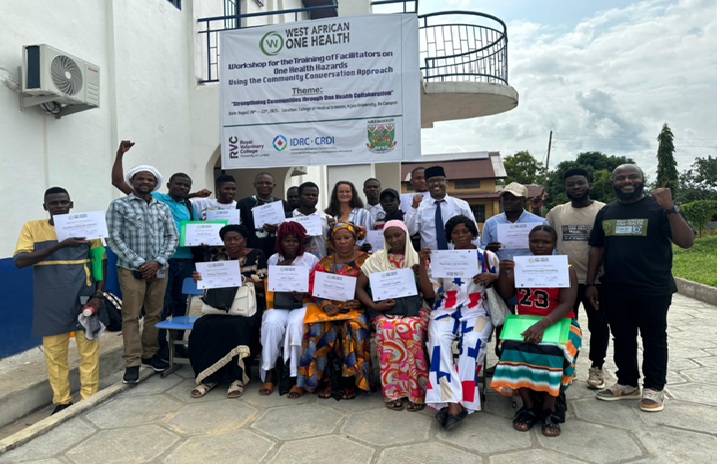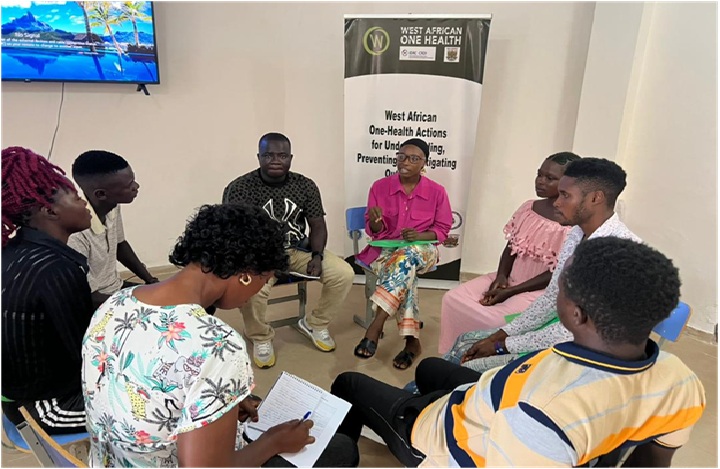Njala University, 26 August 2025
Njala University’s West African One Health (WAOH) Project has successfully completed a three-day Training of Trainers (ToT) workshop designed to equip community facilitators with the skills to lead Community Conversations (CCs) on One Health hazards and climate-sensitive health risks.
The workshop, held from 20–22 August 2025 at the College of Medical Sciences, Kowama Campus, Bo, was organised by Njala University in partnership with the Royal Veterinary College (RVC), United Kingdom, with support from the International Development Research Centre (IDRC), Canada. It was conducted under the theme ‘Strengthening Communities through One Health Collaboration.’
A total of 16 participants attended the training, representing Community Action Networks (CANs) from 16 border communities across eight districts—Pujehun, Kenema, Kailahun, Kono, Kambia, Koinadugu, Port Loko, and Falaba.  These trained facilitators will now roll out CC sessions in the next 3 months (September to November, 2025) within their communities to help build resilience against zoonotic diseases and climate-related health threats.
These trained facilitators will now roll out CC sessions in the next 3 months (September to November, 2025) within their communities to help build resilience against zoonotic diseases and climate-related health threats.
The sessions were led by Dr Abdinasir Yusuf Osman, veterinary epidemiologist from RVC, UK, and co-facilitated by Monya Konneh, WAOH socio-ecologist and Assistant Project Coordinator at Njala University.
Delivering the keynote address, Professor Rashid Ansumana, Dean of the College of Medical Sciences, underscored the importance of empowering facilitators to champion One Health at the grassroots. “Community Conversations are not lectures; they are spaces for people to reflect, share, and act on their own realities. By training CAN members to lead these dialogues, we are ensuring that vital One Health messages will reach households and influence everyday practices,” he noted.
In her closing remarks, Amber Martin, WAOH Project Coordinator, commended participants for their dedication and active engagement throughout the training. She emphasized that the workshop had equipped them with the skills to lead conversations on health hazards, climate change, food systems, water and sanitation, and other issues critical to community wellbeing. Describing the group work as “phenomenal,” she urged participants to take the lessons learned back to their communities.
Amber likened the One Health Approach to a bicycle wheel, with climate, health, education, nutrition, and financial security acting as spokes – each essential to a stable and functioning society. She reminded participants that as community leaders, they serve as “first responders” in addressing local challenges, particularly in areas with limited government resources. She called on them to sustain momentum beyond the life of the project by continuing to educate, mobilize, and inspire their communities toward better practices in health, environmental protection, and social development.
Speaking during the closing ceremony, Mr Gasimu Mallah, Director of the People’s Development Organization (PDO), encouraged participants to put their new skills into practice. “The knowledge you have gained must flow into your communities. By owning and driving these conversations, you can prevent diseases and strengthen trust between communities and health systems,” he stated.
During the training, participants were introduced to five key domains of Community Conversations:
- Hazards from daily human–animal interactions (rodent infestations, livestock management, bushmeat handling).
- Hazards from animal bites (rabies and post-exposure care).
- Food and water safety (cholera, brucellosis, salmonellosis, hygiene).
- Management of sick and dead animals (anthrax, antimicrobial resistance, Ebola risks).
- One Health and climate adaptation (vector control, flooding, reforestation, resilience strategies).
Using participatory approaches such as storytelling, role plays, problem scenarios, community mapping, and group discussions, the participants practised guiding CCs in ways that encourage reflection and practical action. Each session concluded with the development of community action plans to translate conversations into tangible behaviour change.
 Facilitators also highlighted challenges facing their communities, including limited mobility support, PPR vaccine availability, PPEs and the need for visibility tools such as T-shirts. These inputs were documented to inform future project planning.
Facilitators also highlighted challenges facing their communities, including limited mobility support, PPR vaccine availability, PPEs and the need for visibility tools such as T-shirts. These inputs were documented to inform future project planning.
The workshop concluded with field debriefings, lessons-learned sessions, post-training assessments, and the certification of participants. Monya Konneh emphasize that the newly trained facilitators will not only strengthen CANs but also reinforce linkages between local communities and national One Health structures—contributing to Sierra Leone’s epidemic preparedness and climate resilience.
Credit: Public Relations Unit, Njala University













